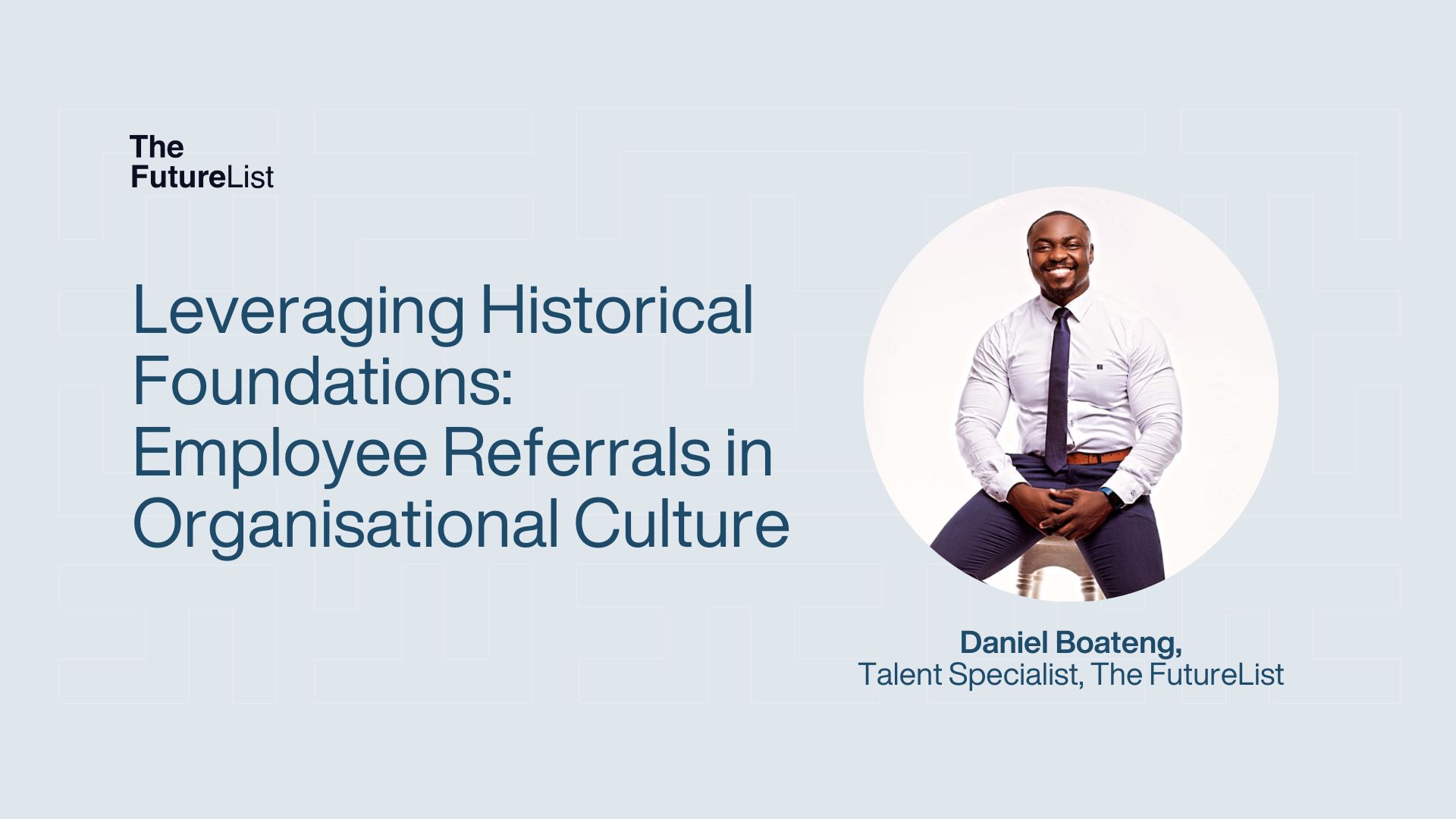
Leveraging Historical Foundations: Employee Referrals in Organisational Culture
In today’ corporate world, maintaining a strong organisational culture is imperative for sustained success. While various strategies contribute to fostering a cohesive culture, employee referrals stand out as a powerful tool deeply rooted in the historical evolution of talent acquisition.
During the mid-20th century, as businesses began to focus more on human resources management and developing strategies for talent acquisition and retention, the practice of employee referrals emerged as a natural solution to recruitment challenges. This method, rooted in trust and familiarity, proved invaluable as existing employees tapped into their networks to recommend suitable candidates who were not only skilled but also aligned with the company’s culture and values.
Over time, what started as an informal process evolved into formalised referral programs, offering incentives to employees who referred successful candidates. Today, employee referrals are widely accepted and embraced by organisations across various industries and sectors, recognised for their cost-effectiveness, efficiency, and ability to contribute to better quality hires, higher employee engagement, and stronger organisational culture.
In this article, we delve into the significance of employee referrals in maintaining and nurturing organisational culture, exploring how this historical foundation continues to shape modern recruitment strategies and drive sustainable business success.
Building Trust and Cohesion
Employee referrals serve as a testament to the trust and cohesion within an organization. When employees recommend candidates, they implicitly vouch for their character, work ethic, and cultural fit. This trust fosters a sense of belonging and camaraderie among colleagues, reinforcing the existing cultural values.
Cultural Alignment
Organisational culture encompasses shared beliefs, values, and behaviours that define the company’s identity. By recommending candidates who align with these cultural tenets, employees contribute to the reinforcement and preservation of the desired cultural environment. This alignment helps sustain a cohesive workforce where individuals are more likely to collaborate effectively and contribute positively to the organization’s goals.
Faster Assimilation and Integration
New hires referred by existing employees often experience a smoother onboarding process. They enter the organisation already acquainted with its culture, norms, and expectations, thanks to insights shared by their referrer. This familiarity accelerates their assimilation into the company culture, reducing the time needed to adapt and increasing their overall engagement and productivity.
Enhanced Employee Engagement and Retention
Employees who refer candidates are more invested in the organisation’s success. They take pride in contributing to its growth by recommending talented individuals who can further enrich the culture and drive performance. This heightened engagement fosters a sense of ownership and loyalty among employees, leading to higher retention rates and lower turnover costs.
Cost-Effectiveness and Quality of Hire
From a recruitment standpoint, employee referrals offer significant cost savings compared to traditional hiring methods. Referral programs typically have lower acquisition costs and shorter time-to-hire metrics. Moreover, referred candidates tend to be of higher quality and stay longer with the company, further enhancing the return on investment in recruitment efforts.
Continuous Cultural Reinforcement
Employee referrals are not a one-time event but a continuous process that reinforces the organisational culture over time. As existing employees refer new talent, they perpetuate cultural norms and values, ensuring their perpetuation across generations of employees. This cyclical reinforcement contributes to the resilience and longevity of the organisational culture amidst evolving market dynamics.
Conclusion
In conclusion, employee referrals play a pivotal role in maintaining and nurturing organisational culture. By aligning with cultural values, fostering trust and cohesion, expediting onboarding, and enhancing employee engagement, referrals contribute to a harmonious and productive work environment. Leveraging employee referrals as a strategic tool not only strengthens the fabric of organisational culture but also drives sustainable business success in the long run.
At The FutureList, we understand the importance of building a strong tech team that aligns with your specific goals and requirements. Our dedicated team of experts and talent partners are here to provide personalised advisory sessions to assist you in assembling a top-notch tech team through navigating the complexities of talent acquisition and creating a dynamic team that drives your organisation’s success. Don’t hesitate to reach out to schedule an advisory call here.
Get innovation insights from The FutureList weekly. Subscribe to our newsletter here
Categories
- Agritech
- Artificial Intelligence
- Biotech
- Blockchain
- Climate Tech
- Data Infrastructure
- Edtech
- Events
- Fashion
- Fintech
- Healthtech
- Infrastructure
- Innovation Memos
- Innovation Scout Program
- Insight
- Insurtech
- Machine Learning
- Martech
- Mobility
- Music and Media
- Partner Offers
- Perks
- Procurement
- Proptech
- Retailtech
- Ridehailing
- Ridesharing
- Robotics
- Space Aviation
- Supply Chain
- Talent
- Telecoms
- Uncategorized
- Venture Capital
- Wastetech
- Women In Tech
Recent Posts
- How AI Surveillance is Shaping Public Safety in Smart Cities
- Innovation Memo with Zencey: Bringing Equitable Healthcare to Africa
- Inside the Software Model Running Modern Harbours
- The Formula for Future Speed: Data-Driven Performance in Racing
- Leveraging Next-Gen Endoscopic Interventions and Innovations for Healthcare